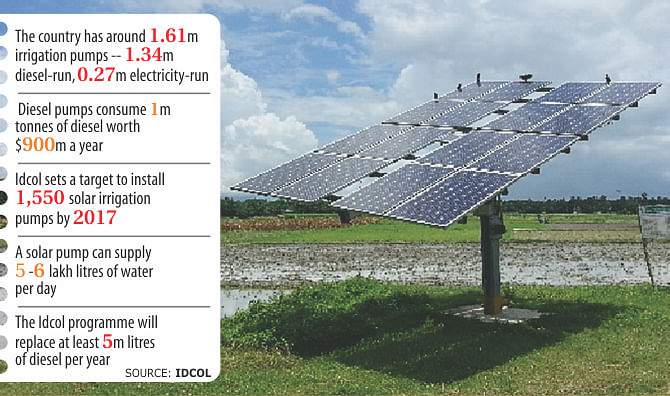Solar irrigation pumps gaining traction
Solar irrigation pumps gaining traction

Solar-powered irrigation pumps are gaining popularity owing to cost-effective financing and an innovative business model.
The country now has around 120 solar irrigation pumps, the majority of which were installed last year, according to Md Enamul Karim Pavel, head of renewable energy at Infrastructure Development Company Ltd (Idcol).
Of the total, Idcol has installed 40 last year, with the help of other organisations.
He said an increased number of people are getting interested in solar irrigation pumps due to their financial viability and lower cost.
A farmer has to pay Tk 3,000-Tk 4,000 for each bigha of land as irrigation charge during a crop season for diesel or electricity run pump, whereas for solar irrigation pumps it is Tk 2,500-Tk 2,800, he added.
Considering its immense potential, Idcol has now set a target of installing 1,550 solar irrigation pumps by 2017.
“We want to install more solar irrigation pumps across the country as it will ensure a sustainable energy solution and reduce dependency on fossil fuels,” said Mahmood Malik, Idcol's chief executive officer.
Till now, Idcol has approved 198 solar irrigation pumps, with 55 of them already set up and the remaining under the implementation phase, he said.
Under Idcol's solar irrigation programme, pumps with 5-11 kWp capacity and dynamic head ranging from 10-18 metres are being used.
The pumps can supply 5-6 lakh litres of water per day, sufficient to provide irrigation facility for 1,500 decimal of land for paddy and 3,500 decimal of land for vegetable cultivation per season.
“Installation of solar irrigation pump will certainly help the country save a huge amount of foreign currency,” Malik said.
Currently, there are almost 1.61 million irrigation pumps running in the country, of which 1.34 million are diesel-run and 0.27 million electricity-run.
The 1.34 million diesel-run pumps consume 1 million tonnes of diesel worth $900 million per year, with the government providing subsidy of $280 million to keep the diesel fuel cost down, Idcol said.
On the other hand, the 0.27 million electricity-run pumps consume about 1500MW of electricity per year.
The programme aims to install solar PV-based irrigation systems and replace the diesel-based ones in off-grid areas where there are possibilities to produce three types of crops throughout the year, while remaining free from flooding, arsenic contamination or saline water.
Apart from reducing dependency on expensive diesel fuel, these solar irrigation pumps will ensure lower emission of carbon dioxide in the environment.
Individuals cannot apply themselves for financial assistance under the programme; a sponsor has to assess the viability of the project and send the application to Idcol on his/her behalf.
Idcol provides financial support to solar irrigation projects based on debt, equity and grant ratio of 40:20:40.
Subsidy of 40 percent and concessional financing of only 6 percent interest rate a year enable the sponsors to install pumps and sell water at an affordable rate.
The installation of a solar pump with a capacity to lift around 5 lakh litres of water, sufficient to irrigate 15-20 acres, along with other costs will require around Tk 25 lakh.